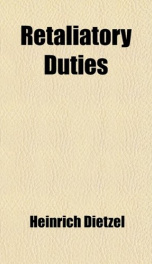retaliatory duties

Purchase of this book includes free trial access to www.million-books.com where you can read more than a million books for free. This is an OCR edition with typos. Excerpt from book: much more effective weapon against Russia than a duty on wheat and the other articles named. As far as Rye is concerned, the position is similar. Germany draws by far its largest supply of that article from Russia. (This is the reason why in 1891 the price of rye rose relatively so much more vigorously than that of wheat.) It would have taken a considerable time to find a substitute for Russian rye,1and supposing it to have been grown more extensively in Austria-Hungary or Roumania or the United States, Germany would probably have had to pay decidedly higher prices there than for the rye previously bought in Russia. 1 If Germany had excluded Russian rye by high differential duties, it would naturally have been offered in larger quantities than before to Austria-Hungary and Roumania. In this way, rye which had been hitherto kept for consumption at home would have been set free for export to Germany ; Russian competition would have compelled the Hungarians and Roumanians to offer their rye in our markets. Germany would thus to some extent have been able to supply its lack ; but in all probability, save when harvests were far better than the average, we should have had to pay pretty dearly for it, even if the supply had been adequate. The statistics of our rye imports during the last decennial seem to me to warrant this inference. Whenever Russia was unable to meet the German demand to the usual extent (as, for example, in 1891-92, and 1897-98), it was not the Danubian States, but America that helped us out of our difficulty (see " Statistisches Jahrbuch des deutschen Reichs," 1901, p. 96). But the United States cannot be relied on for this purpose. They produce very little rye and for the most part export only quite minute quantities. It was a happy accident that just when ...
Info about the book
Author:
Series:
Unknown
ISBN:
0415155274
Rating:
3.5/5 (4)Your rating:
0/5
Languge:
English
Users who have this book
Users who want this book
What readers are saying
What do you think? Write your own comment on this book!
write a commentif you like retaliatory duties try:
Other books by this author
Do you want to exchange books? It’s EASY!
Get registered and find other users who want to give their favourite books to good hands!


